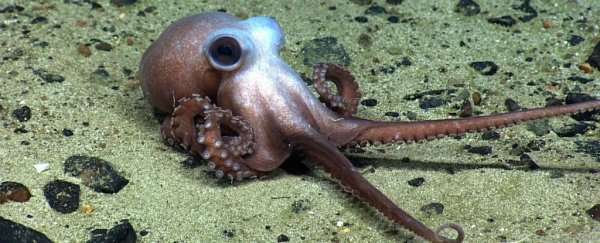President Obama has just announced that the US government has officially created the first Atlantic-based national marine monument off the coast of Cape Cod in Massachusetts.
The region – now known as the Northeast Canyons and Seamounts Marine National Monument – covers an area of 4,913 square miles (12,724 square kilometres), and is basically an underwater forest, complete with caverns, plant life, and marine creatures.
"We're protecting fragile ecosystems off the coast of New England, including pristine underseas canyons and seamounts," Obama said during a recent conference in Washington, DC.
"We're helping make the oceans more resilient to climate change … and we're doing it in a way that respects the fishing industry's unique role in New England's economy and history."
The announcement comes only a month after Obama expanded the Hawaii's Papahānaumokuākea Marine National Monument in the Pacific Ocean by a whopping 442,781 square miles (1,146,797 square kilometres). With a total coverage area of 582,578 square miles (1,508,870 square kilometres), it's now the biggest ecologically protected monument on Earth.
The newly established Northeast Canyons and Seamounts Marine National Monument – which some have called the 'deep sea Serengeti' and the 'underwater Yellowstone' – is much smaller than Papahānaumokuāke, but Obama says it carries equal importance.
"Anybody who grows up on an island, certainly those of us who grew up in Hawaii, learned very early on to appreciate [the ocean's] magic," Obama said during the recent announcement, reports Tovia Smith for NPR.
"The notion that the ocean I grew up with is not something I can pass on to my kids and my grandkids is unacceptable. It's unimaginable. And so the investment that all of us together make here today is vital for our economy, it's vital for our foreign policy, it's vital for our security, but it's also vital for our spirit. It's vital to who we are."
While many activists are celebrating the new monument's creation, opponents say that protecting land off the coast of Cape Cod will negatively impact the fishing industry.
"We don't normally create laws in this country by the stroke of an imperial pen," spokesman Bob Vanasse, from the National Coalition for Fishing Communities, told NPR, alluding to Obama's use of presidential power to create the monument.
"We anticipate the offshore lobster industry will be affected to the tune of about $10 million per year. On top of that, one of the most affected industries is going to be the Atlantic red crab industry. It is going to be very significantly impacted."
In response, officials say that they have put in writing a seven-year grace period for red crab and lobster fisherman, so they can find new areas to fish, which will hopefully soften the financial blow for those who make their living from the ocean.
Despite the economic concerns, with reports coming out seemingly every week about the declining state of the world's oceans, creating more and more protected areas will hopefully help vital ecosystems thrive into the future.
